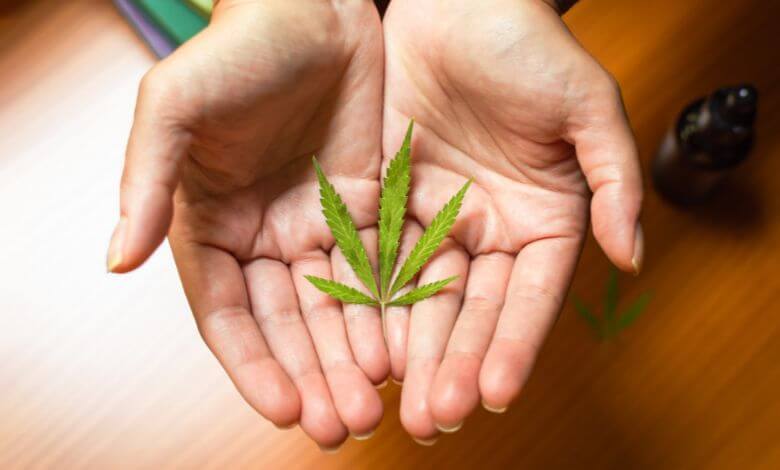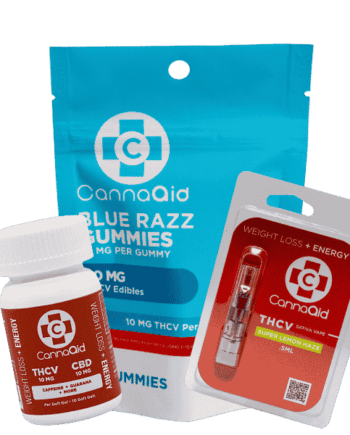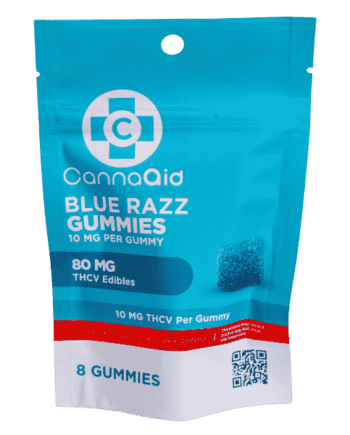What is THCV? This question often arises as people delve into the diverse realm of cannabinoids. Tetrahydrocannabivarin, or THCV, is a special compound present in cannabis that is drawing interest due to its overall advantages. This particular cannabinoid is special as, although it has some characteristics in common with delta-9 THC—the primary psychoactive cannabinoid found in marijuana—it also possesses unique qualities of its own. In this comprehensive guide, we’ll explore THCV in-depth, covering its properties, uses, and common products.
Table of Contents:
- Key Takeaways
- How Does THCv Work?
- What is the Best Way to Use THCv Products?
- What is THCV?
- Is THCV Legal?
- Is THCV Safe to Use?
- Where Can You Find THCV?
- Conclusion
- FAQs
- Does THCV Get You High?
- What Is The Dosage Of THCv Oil?
- What Does THCV Do to the Body?
- Is THCV Legal in Which States?
- Is THCV Safe to Drive?
- What Is THCv Known For?
- Is THCV Natural or Synthetic?
- Does THCV Show Up on a Drug Test?
- Is THCV the Same as Delta–8?
Key Takeaways
Before delving into the specifics, let’s highlight key takeaways about THCV.
- A rare cannabinoid called tetrahydrocannabivarin (THCv) is present in some cannabis plant strains.
- It’s distinct from THC, the well-known psychoactive cannabinoid, and it boasts unique effects.
- Although there are yet no products that may conclusively promote health due to the limited scope of THCv research and tissue culture, the preliminary findings are encouraging.
- THCV is available in various products, such as gummies, tinctures, softgels, and vape cartridges.
How Does THCv Work?
Through their interactions with the receptors of the endocannabinoid system, cannabinoids have a variety of potential effects on the human body. The primary receptors, CB1 and CB2, are situated in different parts of the body. The brain’s neurotransmitters interact with CB1 receptors, which are primarily found in the central nervous system, to produce effects that change perception. In contrast, CB2 receptors, located in the peripheral nervous system, are associated with supporting immune function.
THC interacts with CB1 receptors as an agonist, resulting in psychoactive effects. However, THCv, a complex cannabinoid, is an antagonist to CB1 receptors, exhibiting effects opposite to THC in the brain. THCV functions to counteract the psychoactive effects of THC, not to induce intoxication. Despite being a promising area of research, more studies are needed to comprehensively understand the pharmacological effects of THCv due to its relatively recent exploration. Unlike THC, THCV is not solely psychoactive. Instead, it exhibits a range of effects that may contribute to its growing popularity.
What is the Best Way to Use THCv Products?
As awareness grows regarding the potential wellness benefits of THCv, an increasing variety of THCv products is entering the market. Selecting the appropriate product and mode of consumption is essential to maximizing the benefits of THCV. Whether it’s gummies, tinctures, soft gels, or vape cartridges, each form offers a unique experience. Discovering the best fit for your needs involves considering factors like onset time and duration of effects.
People can choose THCv derived from hemp, which has less than 0.3% Delta-9 THC, in states where recreational marijuana use is still illegal. THCv products can be incorporated into daily routines similarly to other cannabis products, such as adding a few drops of THCv oil to morning coffee or using a THCv vape pen for a quick dose of cannabinoids. Regardless of the chosen method, THCv products have the potential to be a valuable addition to one’s wellness routine.
What is THCV?
Cannabis plants contain more than one hundred active compounds called cannabinoids, which influence mammals’ endocannabinoid systems. One of the latest minor cannabinoids gaining attention is tetrahydrocannabivarin (THCv), found in some hemp and marijuana strains. The main psychoactive ingredient in marijuana, THC, has a molecular structure that is very similar to that of THCv, which is a homolog of THC.
A homolog is a molecule with a similar structure or function to another molecule. THCv differs from THC in that it lacks two carbon atoms on the alkyl chain, despite having almost identical chemical structures and binding to the same brain receptors. While both molecules are significant in studying how different compounds work in the body, THCv’s unique features warrant further investigation into its potential therapeutic benefits.
Researchers speculate that one advantage of THCv is its lower likelihood of producing psychoactive effects, a characteristic that sets it apart from THC. Understanding the similarities and differences between these molecules is crucial for developing new and more effective treatments for various conditions.
Is THCV Legal?
Yes, THCV is legal if it is hemp-derived, however, THCv’s legality is a subject of controversy, with a gray area at the federal level in the United States. While structurally similar to THC, THCv has no explicit federal prohibition. Generally, products with less than 0.3% THC are federally legal. The Controlled Substances Act excludes THCv from the definitions of “cannabimimetic agents” and “tetrahydrocannabinols,” both of which are prohibited.
Despite the prohibition of cannabis and cannabis extracts, the 2018 Farm Bill permits hemp-derived cannabinoids, including THCv. There is a potential concern that THCv could be considered similar enough to THC under the Federal Analogue Act to be classified as a Schedule 1 substance. However, legal and scientific experts familiar with the marijuana industry argue that THCv is sufficiently distinct, avoiding classification as an analog or falling under the prohibited “tetrahydrocannabinol” label.
As a general guideline, THCv should be legal in states that have legalized marijuana/THC for recreational and medical uses. It is essential to check the specific laws in your state before purchasing any marijuana product.
Is THCV Safe to Use?
Yes, it is considered safe under certain conditions. Similarly to THC and CBD, these cannabinoids interact with the endocannabinoid system. Specifically, THCv, by blocking CB1 receptors, is responsible for a variety of body functions. Conversely, Delta-8-THC, which activates CB1 receptors, may induce euphoria and release hunger hormones but may contribute to weight loss by potentially boosting metabolism despite increasing appetite but there are no guarantees and the FDA has not yet approved any THCV products.
Remember that the FDA has not approved any cannabis products, including those that contain THCv. To ensure quality and safety, it is imperative to purchase these products from a licensed dispensary. Additionally, individuals considering the use of THCv or any cannabinoids should consult with their healthcare provider, especially if they have concerns or pre-existing medical conditions. While low dosages of THCv are generally well-tolerated, seeking professional advice and obtaining products from reputable sources are essential steps in promoting safe usage within the evolving landscape of cannabis-related therapeutics.
Where Can You Find THCV?
If you’re searching for high-THCV strains and products to experience the effects, it can be challenging, as most strains contain only trace amounts of THCV. But don’t fret; we got you at CannaAid! We have THCV gummies, THCV tinctures, THCV softgels, and THCV vape cartridges. However, with the growing popularity of THCV, more products are likely to be introduced in the future. In the meantime, the following advice will assist you in locating this uncommon medicinal substance:
1. Explore African Sativas
Lab results indicate that THCV is most abundant in sativa strains, especially landrace strains originating from Africa. Examples include Durban Poison, a relatively common high-THCV strain.
2. Consider Parent Genetics
If African sativas are scarce, look for strains with hybridized African genetics, as they may predispose the strain to a higher THCV potential. For instance, Cherry Pie may express high THCV content due to its Durban Poison parent.
3. Request Test Results
A high THCV content cannot be guaranteed solely by genetic information, and cannabinoid levels can differ between harvests. Ask your budtender for lab-tested strains if at all possible to make sure you are getting a high THC product. This extra step ensures a more reliable and consistent experience.
Conclusion
Finally, this thorough guide explores the fascinating realm of Tetrahydrocannabivarin (THCV) and its possible advantages. As users explore the nuances of this rare cannabinoid, they discover that THCV, distinct from its counterpart THC, possesses unique qualities that make it a subject of growing interest. With its ability to block CB1 receptors, THCV may contribute to appetite suppression, aid in weight loss, boost energy levels, and improve focus.
The guide emphasizes key takeaways, such as the distinction between THCV and THC, the potential benefits of THCV, and its availability in various products like gummies, tinctures, softgels, and vape cartridges.
The legality of THCV is discussed, noting the evolving landscape at the federal level and emphasizing the importance of checking state laws before purchasing any cannabis product. Safety considerations are also highlighted, underscoring the necessity of obtaining THCV products from licensed dispensaries and consulting healthcare professionals, especially in the absence of FDA approval.
The guide concludes with a thoughtful reminder to users, encouraging them to make informed decisions about incorporating THCV into their wellness routines. The call to consult with healthcare professionals for personalized advice reinforces the commitment to responsible and safe usage. It is advised that anyone interested in THCV take a look at CannaAid for a variety of THCV products as well as other hemp-derived products.
FAQs
Does THCV Get You High?
No,THCv, often referred to as an “antipsychoactive,” has the opposite effect, suppressing hunger and potentially neutralizing some of THC’s psychoactive effects.
What Is The Dosage Of THCv Oil?
There is not much evidence to support dosage recommendations; however, one study found that 2.5 mg had the potential to be helpful in reducing negative side effects that are common with THC usage. As always, it is recommended to start small and monitor your response; you may always take more if needed.
What Does THCV Do to the Body?
Because THCv interacts with the body’s CB1 and CB2 receptors, which are involved in the regulation of mood and food intake, it affects a number of physiological activities. Its influence on hunger and mood is particularly noteworthy.
Is THCV Legal in Which States?
Yes, THCv is allowed in all states where cannabis has been allowed in the US since 2021. It is important to check your local laws since state laws vary. These laws also govern the manufacturing and distribution of THCv products. Check your state’s regulations for the latest information.
Is THCV Safe to Drive?
No, like other cannabis compounds, THCv can have an impact on cognitive and motor skills. Therefore, it is usually not advised to drive after consuming THCv. This advice is in line with the overarching rule prohibiting operating a vehicle while under the influence of any psychoactive substance. It’s recommended to avoid driving under the influence of THCV or any psychoactive substance.
What Is THCv Known For?
THCv has gained attention due to its unusual combination of benefits, which include the ability to reduce appetite and the promotion of energy, which appeals to people who practice intermittent fasting.
Is THCV Natural or Synthetic?
Yes, it is natural. Clarifying whether THCV is naturally occurring or synthetically produced provides insight into its origin and quality. THCv is found naturally in cannabis plants. Heat or light exposure transforms THCvA, a byproduct of cannabigerolic acid (CBGA), into THCv.
Does THCV Show Up on a Drug Test?
Yes, it is true that THCv can be found in drug tests. Conflicting information exists regarding whether THCv can lead to positive drug tests. Studies indicate that THCv can be detected in urine samples up to two weeks after smoking a single marijuana cigarette. However, testing methods for saliva, blood, and hair have not been extensively studied. To err on the side of caution, individuals may choose to avoid cannabis-derived products altogether to mitigate potential uncertainties associated with drug testing.
Is THCV the Same as Delta–8?
No. Tetrahydrocannabivarin (THCv) and Delta-8-Tetrahydrocannabinol (Delta-8-THC) are considered “rare” or “minor” cannabinoids found in very small amounts in hemp, cannabis, and other plants. These cannabinoids, working similarly to CBD and THC, bind to the endocannabinoid system. THCv and Delta 8 have opposite effects on the endocannabinoid system.



